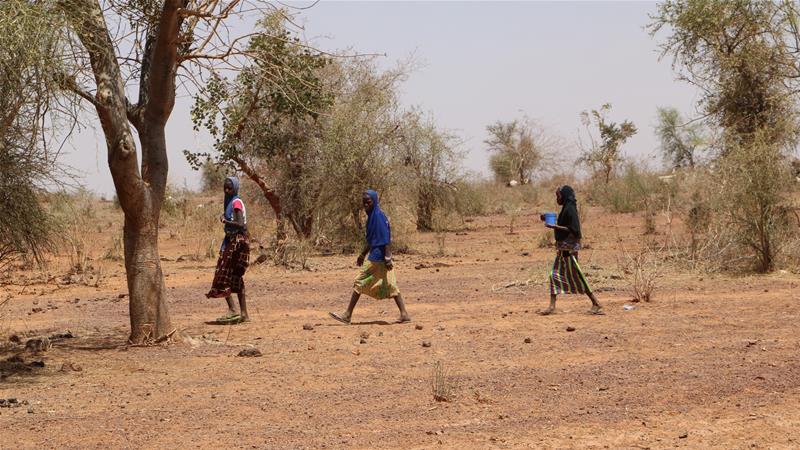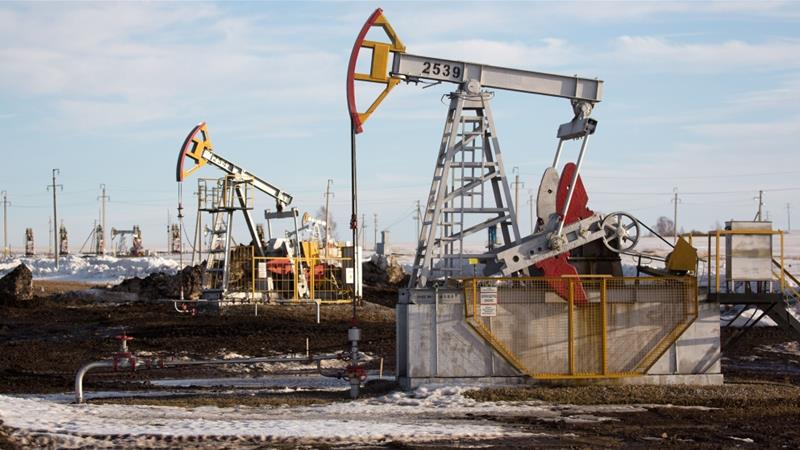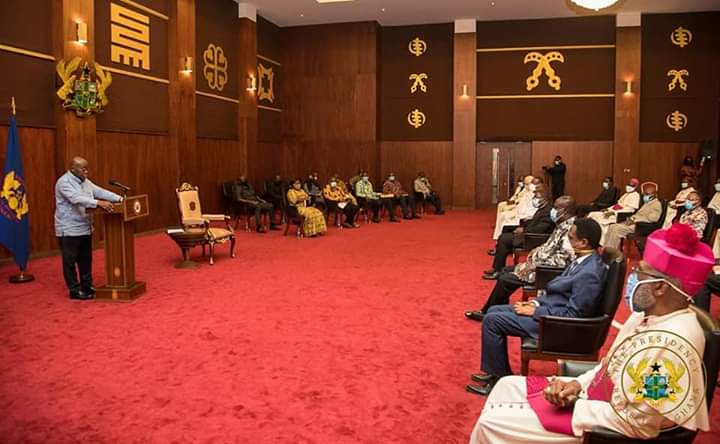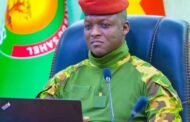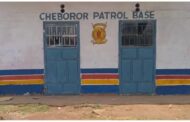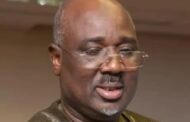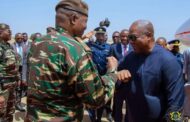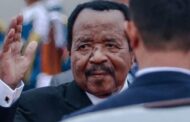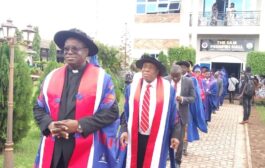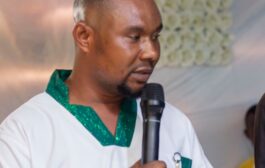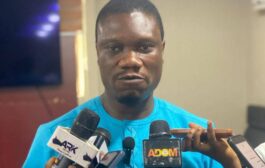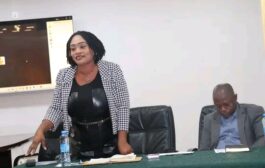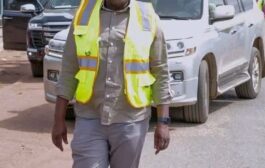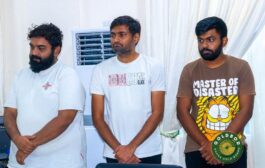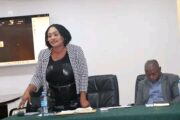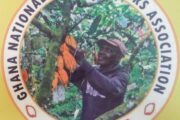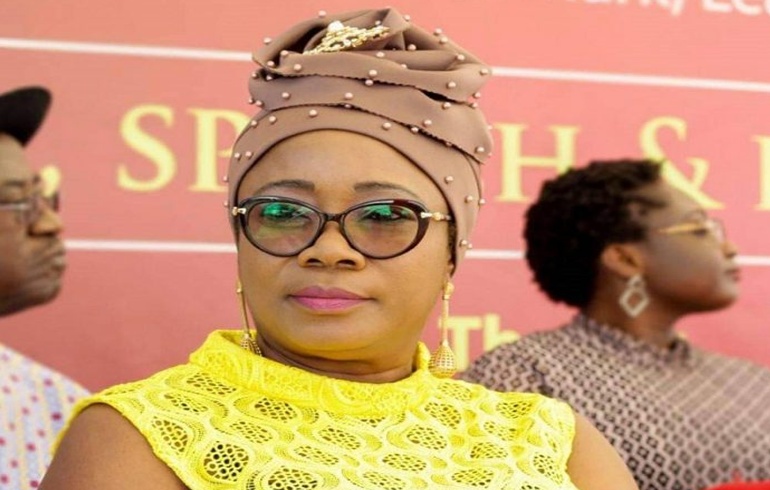Editor’s note: To maintain the family’s safety and anonymity, all names have been changed and details that identify the village have been omitted.
Just weeks after Dina’s father celebrated two decades of being a pastor, he was murdered by men who did not think he should preach.
Staring longingly at her phone, the 23-year-old runs her fingers over a photo of him smiling with friends and relatives at his party in January.
“I wish he was still alive so things could be like before,” she said. “The sadness is unbearable.”
It was a Monday evening in early February when Dina, who was living in Burkina Faso’s capital, Ouagadougou, heard that armed fighters had kidnapped seven people from her family’s home in the country’s Sahel region – an arid expanse below the Sahara Desert. Her father, a pastor at the village church, her 20-year-old brother, 15-year-old sister Jane, and 17-year-old cousin Mary, were among those abducted.
Three days later, everyone besides Jane and Mary had been killed.
![Burkina Faso abduction - [Sam Mednick/Al Jazeera] Burkina Faso abduction - [Sam Mednick/Al Jazeera]](https://www.aljazeera.com/mritems/Images/2020/4/20/825ceb3f291b4ff09398f8a6425c552c_18.jpg)
Violence has ravaged the once peaceful nation as attacks linked to armed fighters and local defence groups have displaced nearly 840,000 people, according to the United Nations, creating one of the fastest-growing displacement crises in the world. The country is also one of the hardest hit on the continent in terms of the coronavirus, with 581 cases and 38 deaths as of Monday.
Extremist groups and home-grown militias are exploiting local grievances over land and a lack of social services, and intensifying attacks across the country, including targeting churches and local leaders who do not embody their religious beliefs.
In February, days after Dina’s family was abducted, gunmen killed 24 civilians including a church pastor in the town of Pansi in Yagha province. At least 14 people were killed when gunmen opened fire in a church in the east of the country in December.
Taken in the dead of night
While violence has spread to the centre north, east and western regions, the Sahel remains the epicentre of the crisis, with many towns void of a government presence. The commune where Dina’s family lived was one of the last villages in the area with a functioning government. Now the schools are closed, as is her father’s church where for 20 years the beloved pastor led a small, devoted congregation.
Sitting in a cafe in Ouagadougou, Dina barely makes eye contact as she recounts the harrowing story told to her by her younger sister, Jane, and cousin Mary, the sole survivors of the abduction. Neither of the girls would speak to Al Jazeera directly but Jane made an audio recording of her experience, which corroborates Dina’s account.
![Burkina Faso abduction - [Sam Mednick/Al Jazeera] Burkina Faso abduction - [Sam Mednick/Al Jazeera]](https://www.aljazeera.com/mritems/Images/2020/4/20/fa0ebf8bb75b4b599b90c0564a8d377c_18.jpg)
At 11pm one night, Dina’s mother was asleep and Jane was texting friends in the bedroom next door, when approximately 30 men burst into the house shooting guns and demanding money, said Dina.
Her father was across the compound and out of sight when the men arrived, but instead of escaping, he ran to confront them, she said. In an immediate show of solidarity, the pastor’s son, two nephews and a friend emerged from around the compound to stand by his side.
“They didn’t want to leave him alone,” said Dina.
The gunmen – half of whom were dressed in what appeared to be military fatigues, the other half in brown trousers – cuffed and blindfolded seven of them: Dina’s father, her brother and his teenage friend, two of Dina’s 15-year-old male cousins, and Mary and Jane.
They forced everyone into a 4X4 and drove into the bush.
Kidnappings as currency
Kidnappings and forced disappearances by armed groups in Burkina Faso have increased almost seven-fold between 2017 and 2019 – from eight recorded incidents to 54 – according to the Armed Conflict Location & Event Data Project (ACLED).
“Kidnappings have always been part of the modus operandi of terrorism. They are particularly used to provide terrorist groups with currency in their fights against the states or populations they want to subjugate to violence,” said Siaka Coulibaly, an analyst with the Center for Public Policy Monitoring by Citizens.
![Burkina Faso abduction - [Sam Mednick/Al Jazeera] Burkina Faso abduction - [Sam Mednick/Al Jazeera]](https://www.aljazeera.com/mritems/Images/2020/4/20/883161d972344dd794d3144bd28b0bb6_18.jpg)
Recently some countries, like neighbouring Mali, have expressed willingness to negotiate with these armed groups, and the increase in kidnappings could allow extremists to acquire leverage during negotiations, potentially creating a new “terrorist phenomenon” in West Africa, he added.
According to analysts, most of those who are abducted remain unaccounted for – their fate and whereabouts unknown.
In the 4X4 in the bush that night, scared of the torture they might endure, Dina’s father prayed they would get into a car accident and die instantly, Jane recounted in her audio recording.
“I told my dad to stay strong because God said in the Bible: ‘The lord will fight for you and you shall hold your peace’,” she said.
They drove through the night without incident, arriving the next morning at a non-descript campsite where they were fed a small portion of fried rice. But Dina’s father barely ate, saving the little food he was given for his children. Later that day a man came and started preaching the laws of Islam, forcing the hostages to recite lines from the Quran, said Dina.
“They told my father if he became a Muslim, they’d take him to Mali and he’d be a chief of a terrorist group and my cousins and brother could become terrorists in Mali as well,” she said.
![Burkina Faso abduction - [Sam Mednick/Al Jazeera] Burkina Faso abduction - Sam Mednick](https://www.aljazeera.com/mritems/Images/2020/4/20/58810b4028004c72b5e753e33b00c310_18.jpg)
Burkina Faso’s violence is rooted in neighbouring Mali, which plunged into crisis in 2012, before a French-led military intervention regained control from armed fighters in some major towns.
The initial spillover has evolved into a full-fledged insurgency, putting Burkina Faso at the epicentre of the crisis, Héni Nsaibia, a researcher at ACLED told Al Jazeera. Yet cross-border dynamics persist as groups use uncontrolled expanses between and within countries as bases to regroup and recruit, he said.
He knew he would be killed
After a day of being forced to learn the Quran, the hostages were blindfolded and questioned by their captors about whether they would renounce their God, Jane said in her audio recording.
The pastor – who had converted to Catholicism from Islam more than 30 years ago, but kept his Muslim name – tried to explain to the men that he embraced both religions, but said he would rather die than become a terrorist.
After refusing to acquiesce, her father knew he was going to be killed, said Dina.
Be humble, don’t be arrogant and learn to better control your anger.
THE PASTOR’S LAST WORDS TO HIS DAUGHTER, DINA
Believing that the men might spare the lives of the two girls, the pastor and his son imparted messages for the rest of the family: To take care of their mother, be courageous, continue studying and not to worry about anything, because even in death he would always be by their side, said Dina of her father’s words.
Regarded as the stubborn one in the family, yet also the pastor’s favourite, Dina’s father sent a special note to her: “Be humble, don’t be arrogant and learn to better control your anger,” she said.
Cracking a smile, she joked that when she was younger her family nicknamed her “Djinia-Djon” – a phrase in her local language meaning the “leader of everything bad”, she said.
Her brother’s parting words to his younger sister were inspired by the late Nelson Mandela, the South African anti-apartheid freedom fighter who overcame nearly three decades in prison to become a president.
“I learned that courage is not the absence of fear, but the triumph over it,” he said to Jane the night before he died.
![Burkina Faso abduction - [Sam Mednick/Al Jazeera] Burkina Faso abduction - [Sam Mednick/Al Jazeera]](https://www.aljazeera.com/mritems/Images/2020/4/20/6bc8353655cb4b0983cefd148b2ae771_6.jpg)
The seven hostages spent three days in captivity, while their kidnappers squabbled over their fate. Some of the men wanted to release them, others thought they should all be murdered, while some wanted to kill the men and free the women, said Dina.
By the third day they finally decided.
Five shots
It was a Wednesday afternoon and the kidnappers forced everyone into the car. After driving a short distance, they let the men out, placing them in a circle with Dina’s father and brother at the centre.
The two girls were slowly driven away, while the sound of five gunshots – one for each of the people they had left behind – reverberated behind them.
At least we can see their graves and know where they are, otherwise we’d be living in limbo, constantly terrified.
DINA
“We were sure that our relatives had left this world,” Jane said in the recording.
Together with Mary, she was dropped off along the road and the two girls were shown the way home. They walked for 12 hours before arriving – broken and defeated.
Back in Ouagadougou, Dina was anxiously waiting by her phone. “I thought 95 percent they’d be released,” she said.
But when she heard the news, she was inconsolable.
Days later, the men’s bodies were retrieved and the family held a funeral in their village. But because of the ongoing insecurity, Dina was unable to attend the burial.
She has found some solace in knowing that at least one day she will be able to visit the site to pay her respects.
“At least we can see their graves and know where they are, otherwise we’d be living in limbo, constantly terrified,” she said.
![Burkina Faso abduction - [Sam Mednick/Al Jazeera] Burkina Faso abduction - [Sam Mednick/Al Jazeera]](https://www.aljazeera.com/mritems/Images/2020/4/20/857af9b695b045fcabf041f2d0c84dfd_18.jpg)
Since the incident there have been preliminary investigations into who was behind the attacks. Some family members said they knew a few of the men involved and that they were Fulani members of the community – a tribe that has been largely accused of joining the armed groups.
Due to the real or perceived support for these groups by some Fulanis, their community has been increasingly targeted by the Burkinabe army and local defence groups, who are accused of committing human rights abuses against them. This has sparked concern that the violence has taken a “disturbingly ethnic tone which threatens to worsen and blight ever more lives”, said Corinne Dufka, the West Africa director for Human Rights Watch.
During the abduction, Dina’s cousin had recognised one of attacker’s voices and wanted to confront him, but her father would not let him. He did not want to further community divisions or prompt retaliation against his family after he died, she said.
To date, only one person accused of being connected with the abductions and murders has been arrested, but other suspects have fled, said Dina.
In the weeks following her father’s death, the family moved from the Sahel to settle in Ouagadougou. But life has become harder, and they are struggling to cope financially and emotionally.
“This has turned our life upside down,” Dina said.
“We think about him all the time, and we miss him.”
SOURCE: AL JAZEERA



